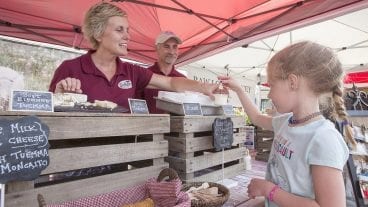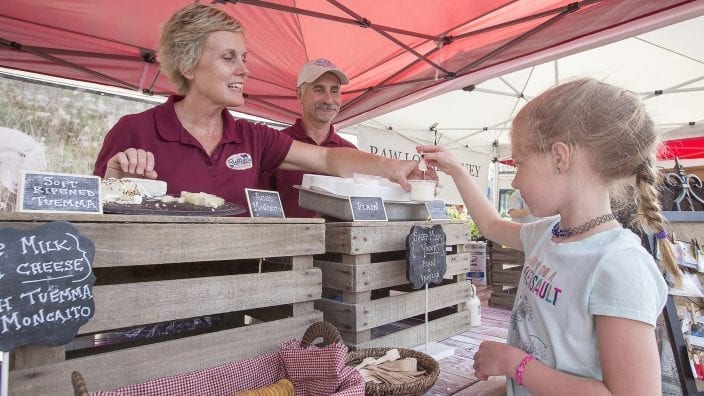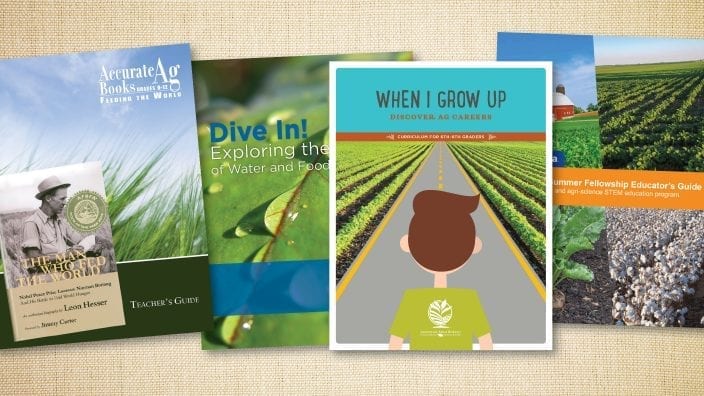Farmer’s Guide to Trucking Regulations available to Ohio Farm Bureau members
The guide includes a farm driver checklist, overview of state and federal regulations and exemptions, CDL qualifications and more.
Read More
People want to know where their food comes from, right? This is what farmers have heard repeatedly for quite a few years now. This desire is the catalyst for the farm-to-table movement and a boom for niche food marketers.
Yet according to the American Farm Bureau Foundation for Agriculture, a recent study found that a staggering 72 percent of consumers who walk into a grocery store have only a vague idea of where the food they are purchasing originated. Almost three in four.
A 2017 story in Forbes magazine stated that according to a report in the Journal of Agricultural Education, “agricultural literacy was at a depressingly low point.”
For years, the American Farm Bureau’s Foundation has worked hard to change that with a wide variety of agricultural literacy education programs for all ages. The original mission of the foundation, which celebrated 50 years in 2017, focused on research about agricultural mechanization and technology. In response to industry advances and assessment of continuing needs, the mission evolved to include a strong educational focus in 2006.
“We were very proud to celebrate the foundation’s 50th anniversary in 2017,” said Christy Lilja, the foundation’s executive director. “We have accomplished so much and grown greatly in the last few years, due in large part to our generous donors and fantastic volunteers. We are excited to see what our future holds.”
The foundation defines an “agriculturally literate” person as someone who understands the relationship between agriculture and the environment, food, fiber and energy, animals, lifestyle, the economy and technology.
“We created the Pillars of Agricultural Literacy as a tool to be used for ag literacy programming,” she said. “With the pillars there is a starting point for creating and evaluating the effectiveness of ag literacy programs which is important to maintain a level of excellence in these programs.”
At this time in our nation’s history, the average consumer is several generations removed from knowing anything about living or working on the family farm. That reality is a catalyst for the goals of AFB Foundation, which are:
Building relationships is the backbone of the national foundation. The organization builds relationships with educational institutions to introduce ag education tools and resources and encourages adoption at the community, county, state and national level. It also monitors and measures the progress of educational materials and programs to ensure their effectiveness.
One of the most popular education resources available to students and their educators is the Food and Farm Facts book and education guide series for grades fourth-sixth, seventh-12th, and a new junior edition for younger students was made available in late 2018.
“Questions about agriculture are not always easy to answer,” Lilja said. “The new Food and Farm Facts Junior edition explains farming practices to young learners in an age-appropriate way.”
Other educational resources include My American Farm, an educational game platform used to engage preschool through fifth-graders in the discovery of relevant agricultural issues. The free site offers agriculturally themed games and more than 100 free educator resources such as ag lesson plans, activity sheets and comics. Visit MyAmericanFarm.com for more information.
“So often teachers pay out of pocket for their classroom resources,” Lilja said. “It is important to us to make as many resources free as we can to make sure teachers across the country have access. We are very lucky to have sponsors like Corteva Agriscience, an Agricultural Division of Dow Dupont that support our My American Farm and Purple Plow platforms.”
Learn more about the efforts of AFBFA and the ag educational opportunities
available.
The American Farm Bureau Foundation for Agriculture entered into the world of publishing in 2018 through a newly-created accurate ag book publishing company: Feeding Minds Press. The foundation announced that it hopes to “reach learners of all ages through engaging stories as they learn where their food comes from and who grows it.” Learn more.
Feature Image: Materials like those above are just a fraction of the resources AFBFA has available to educators. The foundation also has scores of free teacher lesson plans to use in the classroom and beyond. Explore the foundation’s Ag Guide to learn more.


The guide includes a farm driver checklist, overview of state and federal regulations and exemptions, CDL qualifications and more.
Read More


The emergency fuel waiver to allow the sale of summer gasoline blends containing 15% ethanol will lengthen the period during which Americans can continue buying E15 from June 1 to Sept. 15.
Read More

The Small-Scale Food Business Guide covers federal and state regulations for selling food products such as raw meat, dairy, eggs, baked goods, cottage foods, fruits and vegetables, honey and more.
Read More

New resources and technology are broadening the different types of sales tools and strategies available to farmers.
Read More

ODA will enroll 500,000 acres into the program for a two-week sign-up period, beginning April 22, 2024, through May 6, 2024. Contact local SWCD offices to apply.
Read More

Katie Share of Columbus has been named ExploreAg and Youth Development Specialist for Ohio Farm Bureau.
Read More

Mary Klopfenstein of Delphos has been named Young Ag Professional and Ag Literacy Program Specialist for Ohio Farm Bureau.
Read More

The plan has been updated to give sole proprietors access to more rate stability and a smart solution that offers potential savings on health care.
Read More

The American Farm Bureau Federation, in partnership with Farm Credit, is seeking entrepreneurs to apply online by June 15 for the 2025 Farm Bureau Ag Innovation Challenge.
Read More

Adele Flynn of Wellington has been elected treasurer of the Ohio Farm Bureau Federation and now holds the third highest elected office in Ohio’s largest and most influential farm organization.
Read More